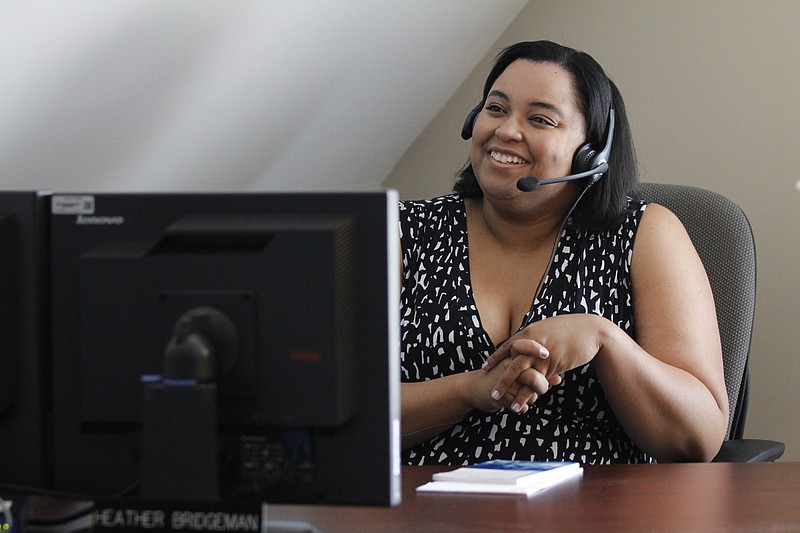What if instead of getting out of bed and spending the next hour getting ready to leave home for work, that person just shuffled to the next room and sat down at a desk for the rest of the day? Providing more employees with the option of telecommuting could help alleviate the traffic congestion on major thoroughfares in Chattanooga that local officials say is inevitable in the future.
"There's this mentality that everyone has to be on the road at 7:30 in the morning and everybody has to be on the road at 5:30 in the afternoon, and there's no option around it," explained Bridgett Massengill, President and CEO of Thrive Regional Partnership. "But if you are working from your house then you aren't on the road during those peak congestion times."
Chattanooga is a cut above the rest when it comes to one thing - fiber optic internet. The power of EPB's 10-gigabit network makes Chattanooga a prime location for telecommuters.
"Data connectivity is the underlying spine to the overall general quality of life question," Massengill says. "It influences education and economic opportunities. It should just be an amenity that all of us have."
Places like BlueCross BlueShield of Tennessee have taken advantage of the local amenity with 86 percent of their more than 6,000 workers provided the opportunity to work from at home at any point. But while BCBS is taking advantange, U.S. Census Bureau figures from a 2013-2017 survey show that only about 5 percent of the more than 163,000 workers over the age of 16 in Hamilton County work from home.
Shannon Clark, principal consultant at BCBS who manages workers in the remote program, said the company has 1,827 full-time commuters right now while other "teleworkers" just take advantage of working from home one or two days a week. The telecommuting program started 10 years ago with just eight employees taking advantage of it.
According to engagement surveys the company does, Clark said their telecommuting population is slighty more engaged and the turnover for remote workers is two percent lower than that of non-remote workers at the company.
"I can tell you that we do still have certain areas of the company that have concerns around it, but usually it's just fear of the unknown," Clark said. "If you can't see what your employees are doing, there are fears that arise. For the most part, people embrace it."
Surveys show that some of the biggest fears for telecommuters is that they will feel alone not being part of an office environment or miss out on promotions. Clark said BCBS has several internal platforms and blogs where workers can ask questions, get advice and share suggestions to the company and other remote workers on working conditions.
For Clark, she said there's really no reason a business wouldn't embrace telecommuting. To be successful, Clark said companies should establish an agreement with remote workers that describes the type of environment they will maintain at home and the kind of support the company will provide them..
"There are distractions at home just like there are at the office," she said. "Set the telecommuter up for success with outlines of what they should do from their home."
Massengill said it will be important to establish telecommuting protocols that businesses and industries across the region can look to for best practices. Chattanooga-based insurance company Unum also has a strong work-from-home program.
"I think every company out there has the potential to look a little differently at some of their policies," Massengill said.
BCBS does require minimum internet requirements for their remote workers, and they take on the expense of outfitting home offices with standard office furniture.
Thrive officials acknowledge that telecommuting isn't an option for some more rural areas of the Chattanooga metro area because internet speeds aren't quick enough, so the nonprofit has also explored the idea of co-working centers, specifically library-based co-working centers where commuters could go to utilize resources instead of driving into downtown.
Libraries in Kansas City, Kansas; Brooklyn, New York; Phoenix, Arizona; Akron, Ohio and more have turned local libraries into shared co-working spaces and/or business incubators for professionals. Thrive officials said compiling a list of all library workspaces in the region and identifying partners will be key for the future of work while also delving into broadband maps to better identify areas without sufficient internet speeds.
"We have to get some of our companies willing to test it and be a testing platform," Massengill said about alternative work setups. "The more that we can be informed around the challenges, the stronger we can be in addressing them holistically in our companies - both small and large."
Contact staff writer Allison Shirk Collins at ashirk@timesfreepress.com, @AllisonSCollins or 423-757-6651.
